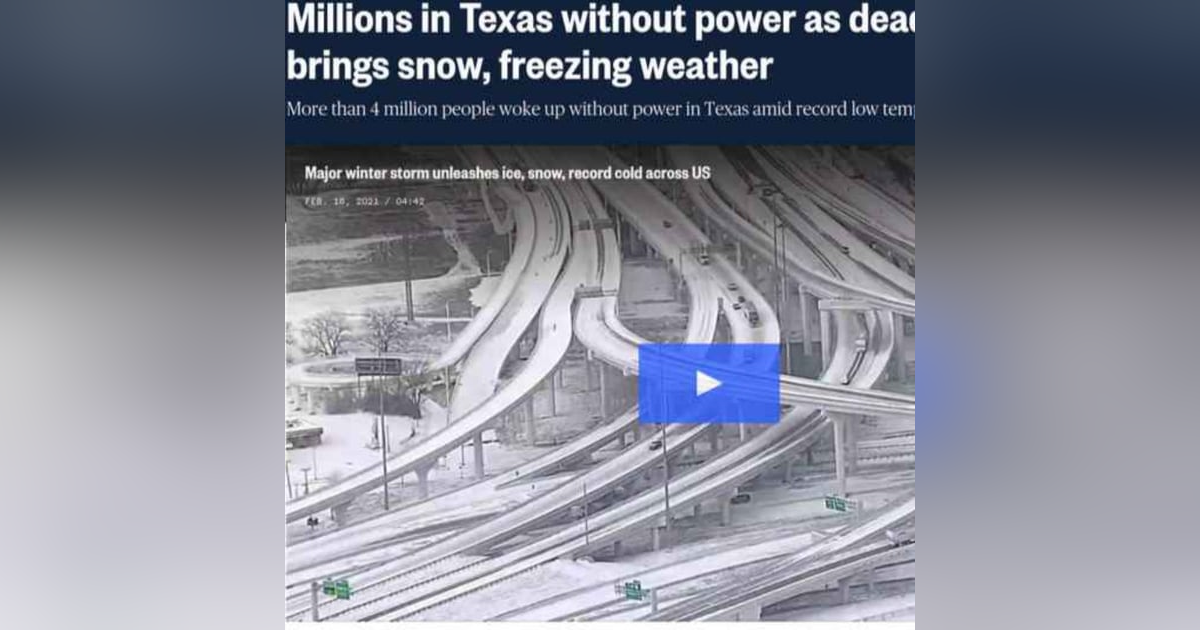Feb. 17, 2021
439: How to Fix Texas

Here are the notes I read from for this episode
How to fix Texas
- Just got off conference call a Texas attendee couldn't attend because her power was out.
- There are helpless people suffering. I empathize with them and feel compassion. I support helping them.
- If we want to prevent future suffering, we have to look at systems. That's not ignoring present pain or loss. It's preventing future pain and loss.
- In that call, one person had been in touch with the Texas person. She told us of ice forming inside her house and other problems.
- The present attendees lamented each mention of a problem as if she were suffering some horrible hardship. For tens of thousands of years, humans have lived without power including in the cold, including sudden, unexpected cold.
- Is it not obvious that what we call technology and innovation has made us dependent, needy, and the opposite of resilient?
- I'll repeat that people in hospitals, homeless, elderly, and others have always needed extra help and they do today. Nothing of what I'm saying suggests neglecting them.
- But she also talked about our Texas friend tweeting. However spotty, she has the internet.
- Let's talk systems.
- NYTimes headline: A Glimpse of America’s Future: Climate Change Means Trouble for Power Grids: Systems are designed to handle spikes in demand, but the wild and unpredictable weather linked to global warming will very likely push grids beyond their limits.
- While the proximal reasons may be technical, the systemic cause is our dual focuses on meeting demand no matter what and growth but not focusing on resilience. The result is that when demand is always met, we grow (population and consumption) until we hit problems like this. Then we build more capacity.
- It costs a lot to go from 99.99% uptime to 99.999%, but we do it every time.
- The savings to go from 99.99% uptime to 99.9% is also huge. Most of the world does fine with under 99% and we could too if we built our systems and lives to handle power going down sometimes, even unpredictably. Hospitals, elderly, etc would need special treatment. The rest of us could reduce our needs and learn from how people lived all the time for hundreds of thousands of years.
- We'd save tons of money, live healthier, and pollute a lot less. We'd learn to treat nature with a bit more humility and respect.
- Listen to my episode on why I unplugged my fridge. I didn't do it because I expected my power savings would amount to anything divided by 7.8 billion.
- I did it because other cultures as well as humans for hundreds of thousands of years thrived without power. While some disasters, like Vesuvius erupting, we can't defend ourselves against, we can prepare for cold without polluting.
- My main results for unplugging my fridge? More delicious food from increasing my skills and experience preparing it. Saving money. Increasing my freedom, decreasing my neediness.
- Again, repeating my compassion for helpless people in pain now, whose rescue and support I support in the moment, I suggest seeing this weather as impetus to make your life more resilient, less needy, to support a power grid more resilient and less brittle but, and a culture not so entitled, spoiled, dependent and needy that its answer to everything is something polluting more, deepening that entitlement and being spoiled.
- If you can't live without power dropping for a few days even in terrible weather, and you aren't someone that lions would have eaten in previous eras, you're part of the problem. Fix yourself without drawing more power and polluting everyone else's world.
- If your society suffers from the only way it handles problems is to use more power, polluting more, leading to suffering from by people who aren't polluting so much, which for Americans means the entire rest of the world outside Saudi Arabia and its oil producing peers and maybe some insanely rich tax havens in the Caribbean, fix your society.
- Changing culture and systems begins with changing values. In this case from coddling, spoiling, externalizing costs, and ignoring others' suffering to resilience and freedom.
Hosted on Acast. See acast.com/privacy for more information.







